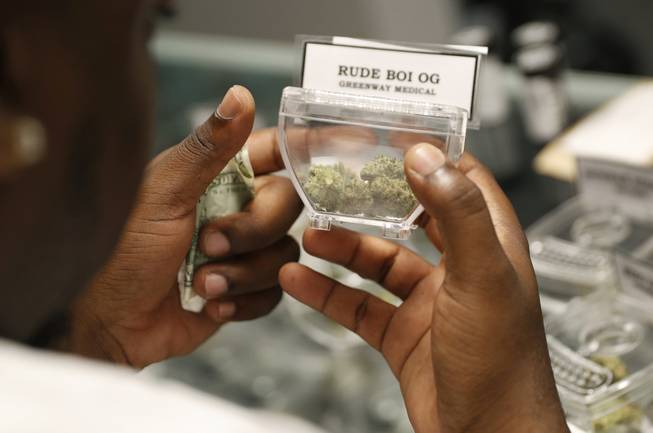
John Locher / AP
In this April 20, 2018, file photo, a customer shops for marijuana at the Exhale Nevada dispensary in Las Vegas.
Monday, June 10, 2019 | 9:30 p.m.
Andrew Jolley, an executive with Nevada Organic Remedies, said it wasn’t his job to analyze how the Nevada Department of Taxation graded applications for cannabis dispensary licenses.
That was one of many responses Monday from Jolley, who was questioned for nearly five hours during a court hearing to address complaints that the state’s marijuana licensing process is unconstitutional.
“If you’re asking if there should be a flawless application process for a very complex program, that would be wonderful, but I don’t think that’s feasible,” said Jolley, who is also the former Nevada Dispensary Association president. “I think the state made its best effort.”
Clark County District Judge Elizabeth Gonzalez is continuing a hearing this week to decide whether Nevada should be blocked from granting dozens of retail marijuana licenses, after losing applicants complained that the scoring system used to determine the winners was biased. The state received 462 applications from established marijuana businesses for 61 conditional licenses, awarding those to 17 companies.
Lawyers for the plaintiffs were particularly interested in the state’s diversity scoring system — one of a set of six criteria used to score applicants on a 250-point scale. They also suspected there were two versions of the application on the state website, and the subtle difference caused confusion with applicants.
Will Kemp, an attorney for the group of plaintiffs, which include the parent company of the Planet 13 brand, suggested that Nevada Organic Remedies received “special treatment” by the state. Nevada Organic Remedies received eight of the 61 licenses.
“I don’t believe that we were deserving of any special treatment,” Jolley said. “I believe that we put our best foot forward following the guidelines of the application. We put together a thorough, honest and complete application.”
Jolley, who remained calm on the stand despite seeming annoyed by some of the questions, said his company’s executives, legal counsel and consultants spent thousands of hours poring over the state’s application requirements.
He said he was “proud” of the way the company put its application package together and suggested that unsuccessful applicants may have overlooked details that were in plain sight.
“It’s not my job to analyze how the department graded the applications that they have the statutory authority to grade,” Jolley said.
Attorneys for the plaintiffs zeroed in on the fact that Nevada Organic Remedies, which does business as The Source, included a number of employees who could be thought of as mid-level executives in a portion of the diversity questionnaire from the state that asked to list “officers, owners and board members.”
Kemp and his team wondered whether the Nevada Organic Remedies human resources director — a woman — belonged on the list.
“(Thrive Cannabis Marketplace) got a lower diversity score than (NOR) got because they didn’t list their internal definition of officers and directors as you did,” Kemp said to Jolley.
The hearing is set to resume Tuesday and is expected to go on for several more days.
Plaintiffs in at least seven lawsuits complain that the license selection process wasn’t transparent, that the state improperly used temporary workers to screen applicants and that bias led to the selection of winners and losers.
Some say the competitive application process was unconstitutional. Some seek a do-over while others want financial damages.
Lawyers for a number of businesses awarded licenses in December, including Essence Cannabis and Thrive, have joined the state in opposing the injunction.
Sun publisher Brian Greenspun was part owner of Essence, one of the defendants in this case.
